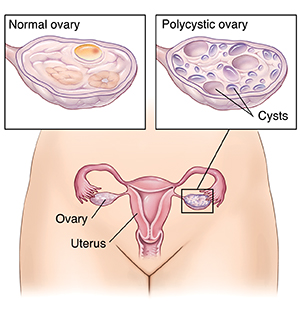When Your Teenager Has Polycystic Ovary Syndrome (PCOS)
Your child has been diagnosed with a condition called polycystic ovary syndrome (PCOS). PCOS is an imbalance of hormones. It affects the ovaries, the organs that store the eggs. PCOS can also affect the rest of the body. It can lead to serious health issues if not treated. Treatment can’t cure the problem. But it helps reduce symptoms and prevent health problems.

What is PCOS?
Androgens are a type of hormone (chemical messenger in the body). They are often called male hormones, but Females make and use some of these hormones also. People with PCOS often have higher levels of androgens than normal. This can lead to changes in the body that include:
-
Ovaries with many small, minor follicles (polycystic)
-
Missed periods, irregular periods, or very light periods
-
Increased body hair growth
-
Weight gain
-
Acne, oily skin, and dandruff
-
Problems getting pregnant (infertility)
-
Thickened or darkened skin patches
Because of the hormone changes, people with PCOS are more likely to develop certain serious health problems. These include type 2 diabetes, high blood pressure, problems with the heart and blood vessels, abnormal cholesterol levels, and uterine cancer.
What causes PCOS?
A child may be more likely to get it if a parent or sibling has the condition. But the exact cause of PCOS is not known.
How is PCOS diagnosed?
There is no single test that can diagnose PCOS. A health history, physical exam, and blood tests help give the diagnosis. A pelvic exam may be done. Other tests, such as a vaginal or pelvic ultrasound, may also be done.
How is PCOS treated?
Medicine is the most common treatment for PCOS. Medicines affect the body’s hormone levels. The most common medicines used to treat PCOS include:
-
Birth control pills (oral contraceptives). These have a combination of female hormones. They can help bring hormones back into balance and reduce or eliminate symptoms. This reduces the risk for endometrial cancer later in life. (A teen doesn't have to be sexually active to take birth control pills.)
-
Insulin-sensitizing medicines. These are used to treat diabetes. They are often used to treat PCOS. These medicines help the body respond to insulin. In people with PCOS, they can help decrease androgen levels and improve ovulation. Restoring ovulation helps make menstrual periods regular and more predictable.
-
Metformin. This is a diabetes medicine that has been shown to help with PCOS symptoms.
-
Antiandrogens. These are medicines that can help reverse the effects of male hormones. They help reduce hair growth and clear acne. They are often combined with birth control pills.
In addition to medicine, regular exercise and healthy eating can help manage PCOS. PCOS makes losing weight much harder. But losing even a little weight can help reduce some PCOS symptoms. Talk with your child’s healthcare provider for more information on weight loss and PCOS.
Working with the healthcare provider
There is no cure for PCOS. So it’s important to manage your child’s condition. Keep in touch with your child’s healthcare provider. Be honest with the provider about how the treatment is going and how your child is responding. Talk about any new changes. And take your child for regular follow-up visits. This helps to ensure that any health problems are found and managed.
To learn more
-
Polycystic Ovarian Syndrome Association at www.pcosupport.org
-
Girls Health.gov at www.girlshealth.gov/parents/parentsbody/pcos_educators.cfm
-
Hormone Foundation at www.hormone.org/public/polycystic.cfm
-
Center for Young Women’s Health at www.youngwomenshealth.org